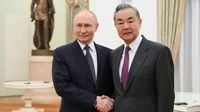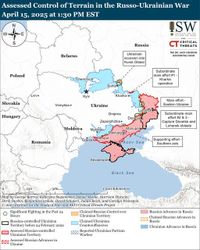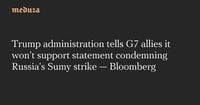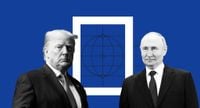The ongoing conflict between Russia and Ukraine has seen a significant escalation in military activities and diplomatic tensions, particularly as the Russian government has reiterated its demands for any peace agreement. On April 15, 2025, Sergey Naryshkin, head of the Russian Foreign Intelligence Service (SVR), stated that any future peace agreement must include Ukraine's neutrality, the demilitarization and "denazification" of the Ukrainian state, and the recognition of Russia's annexation of the Luhansk, Donetsk, Zaporizhia, and Kherson regions. This announcement follows a similar statement from Russian Foreign Minister Sergei Lavrov, who labeled the current Ukrainian government as "unconstitutional" and emphasized that Russia cannot abandon Russian speakers living in occupied territories.
These developments come amid a backdrop of military operations, with Russian forces continuing their offensive in various regions, including Sumy, Kharkiv, and Luhansk. The situation in Sumy has been particularly dire, as a recent missile strike carried out on Palm Sunday resulted in the deaths of at least 35 civilians and injuries to 119 others, according to Ukrainian authorities. Despite the gravity of the situation, the Trump administration has informed its G7 allies that it will not support a statement condemning the attack, citing a desire to "preserve the space to negotiate peace," as reported by Bloomberg.
In the context of the broader conflict, Admiral Samuel Paparo, the top US military leader in the Pacific, has raised alarms about the growing military cooperation between China, North Korea, and Russia. He noted that China has supplied Russia with about 70% of its machine tools and 90% of its legacy semiconductors, which are crucial for rebuilding its defense capabilities. This cooperation poses new security risks in the Indo-Pacific region, particularly as North Korea has reportedly deployed thousands of troops to support Russian forces in Ukraine.
Ukrainian President Volodymyr Zelenskyy recently warned that Russia is actively recruiting Chinese citizens to fight alongside its forces, with over 150 mercenaries already engaged in combat. In response, China has dismissed these accusations as "irresponsible." Meanwhile, North Korea is reportedly sending thousands of artillery shells and short-range missiles to Russia, expecting air defense and surface-to-air missile support in return.
On the ground in Ukraine, the situation remains complex. The Russian government has initiated a Family Mortgage program, offering subsidized loans to Russian citizens looking to purchase property in Ukrainian towns. Some of these towns, like Melitopol and Primorsk, remain under Russian occupation, while others, such as Kherson and Beryslav, have been recaptured by Ukrainian forces. This initiative has been criticized as a political maneuver aimed at showcasing these areas as part of normal Russian life.
In Kramatorsk, a city that has been heavily impacted by the conflict, local residents express deep indignation over the prospect of Russian citizens buying property in their hometowns. Mykola, a local schoolteacher, voiced his anger, saying, "If someone bought my apartment or house, I’d break their arms and legs. How else could I react?" This sentiment reflects the broader feelings of many Ukrainians who see these actions as a psychological tactic by Russia to destabilize their society.
As the conflict continues, the Kremlin's demands for a future peace agreement remain unchanged. Putin's June 2024 demands include that Ukraine must completely withdraw from the territories it controls in Donetsk, Luhansk, Zaporizhia, and Kherson, and abandon its NATO aspirations. These demands are viewed as unrealistic by many in the international community, especially given the ongoing military operations and the increasing complexity of the situation.
Admiral Paparo's testimony before the Senate Armed Services Committee highlighted that the military cooperation among China, North Korea, and Russia adds a layer of complexity to the situation. He emphasized that this cooperation could potentially lead to the sharing of sensitive military technologies, further complicating the security landscape in the region.
On the front lines, Ukrainian forces have reported recent advances near Toretsk and Pokrovsk, while Russian forces continue their operations in various directions, including attempts to push Ukrainian forces out of limited positions in Kursk Oblast. However, both sides have faced challenges in making significant territorial gains amidst ongoing combat.
As of April 15, 2025, the Ukrainian National Guard has announced the formation of two new army corps, consisting of existing brigades, to enhance their operational capabilities. This restructuring aims to bolster command and control within the military and improve their effectiveness in combat.
In conclusion, the situation in Ukraine remains fluid and fraught with challenges. The diplomatic landscape is complicated by Russia's unyielding demands and the ongoing military operations, while the humanitarian toll continues to rise. As both sides navigate this precarious situation, the international community watches closely, hoping for a resolution that can bring an end to the suffering and instability in the region.








